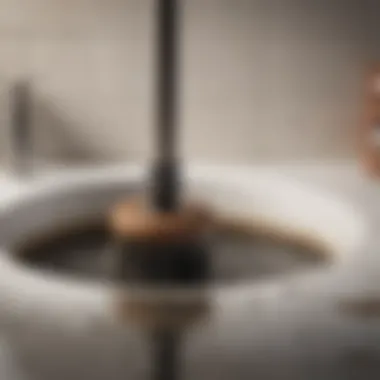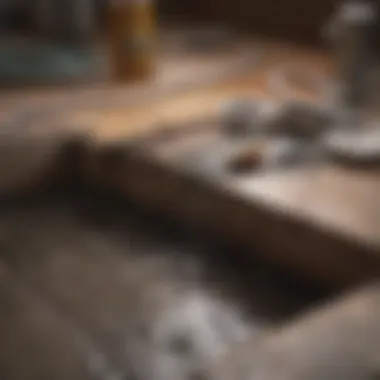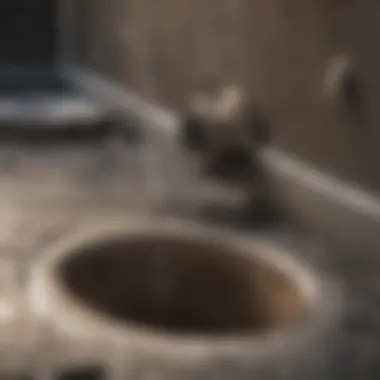Expert Solutions for Clearing a Clogged Disposal Drain Easily


The intricate workings of a disposal drain can often be a mystery, especially when faced with the inconvenience of a clog. Fear not, for in this detailed guide, we will delve deep into the realm of restoring proper functionality to your disposal system. From discerning the underlying causes of obstructions to implementing DIY remedies, every facet of unclogging your disposal drain will be meticulously explored and explained.
Identifying Common Causes of Disposal Drain Clogs
Before embarking on the journey to unclog your disposal drain, it is crucial to first understand the usual suspects behind these vexing blockages. Various factors such as food remnants, grease buildup, or foreign objects can impede the smooth flow of waste, leading to drainage issues. By unraveling the root causes, you can effectively tackle the problem at its source, ensuring lasting solutions.
Food Remnants and Grease Buildup
Oftentimes, leftover food particles and greasy substances are the primary culprits behind disposal drain clogs. These residues can accumulate over time, forming pesky blockages that hinder the natural drainage process. By recognizing the impact of food remnants and grease buildup, you can adopt preventive measures to mitigate their effects and maintain a smoothly functioning disposal system.
Implementing Effective DIY Remedies
When faced with a stubborn disposal drain clog, prompt action is essential to restore proper functionality. In this section, we will explore a range of DIY remedies that can help alleviate blockages and improve drainage performance. From employing natural cleaning solutions to using specialized tools for dislodging obstructions, each method offers a unique approach to unclogging your disposal drain effectively.
Natural Cleaning Solutions
Harnessing the power of simple household ingredients such as baking soda, vinegar, and citrus peels can work wonders in clearing disposal drain clogs. These natural remedies not only break down stubborn residues but also help in deodorizing the system, leaving it fresh and clean. By incorporating these eco-friendly alternatives into your maintenance routine, you can promote sustainable unclogging practices.
Specialized Tools for Unclogging
In cases where DIY solutions may not suffice, utilizing specialized tools like drain augers or plungers can provide added assistance in dislodging tough clogs. These devices offer precision and effectiveness in targeting blockages, ensuring thorough cleaning and optimal drainage flow. By having these tools at your disposal, you can tackle even the most resilient clogs with confidence and ease.
Conclusion
Introduction


In the realm of household maintenance, a critical aspect often overlooked yet of immense importance is the proper care and maintenance of your disposal drain. This article serves as a beacon of enlightenment amidst the murky waters of unclogging dilemmas, shedding light on efficient methods to tackle blockages and uphold the flawless functioning of your disposal system. Whether you're a seasoned homeowner or a newcomer to the realm of plumbing quandaries, the insights gathered here are bound to equip you with the knowledge necessary to navigate through any disposal drain conundrum.
Understanding Disposal Drain Clogs
Delving into the underbelly of disposal drain mechanisms unveils a labyrinth of potential obstacles waiting to impede the smooth flow of waste. From food residue accumulation to grease buildup and the ominous presence of foreign objects, the culprits behind disposal drain clogs are both varied and cunning. Dissecting the anatomy of these clogs allows for a deeper comprehension of how minor neglect can lead to major plumbing catastrophes.
Signs of a Clogged Disposal Drain
Signs of a clogged disposal drain are akin to nature's warning signals - subtle yet unmistakable. The sinister gurgling sounds emanating from your sink, coupled with a slow-draining pace, serve as the heralds of an impending clog crisis. A pungent odor wafting from the depths of your disposal indicates decay and blockage, urging swift action to restore harmony to your kitchen sink.
Importance of Prompt Unclogging
The essence of prompt unclogging cannot be overstated when it comes to disposal drains. Procrastination in the face of a clog spells doom for your plumbing infrastructure, potentially leading to extensive damage and costly repairs. Embracing the ethos of proactive maintenance guarantees a prolonged lifespan for your disposal system, ensuring uninterrupted functionality and peace of mind in your daily culinary endeavors.
Common Causes of Disposal Drain Clogs
In the realm of plumbing nuisances, clogged disposal drains reign supreme as a pervasive and vexing issue. Understanding the common causes behind these disruptions is paramount in mitigating their occurrence and fostering a smoothly functioning disposal system. Food residue accumulation, a primary offender, occurs when remnants of meals, particularly starchy and fibrous substances, congeal within the drain pipes over time. This gradual buildup not only obstructs the flow of water but also provides a breeding ground for foul odors and harmful bacteria. Grease buildup, another notorious culprit, stems from the improper disposal of greasy substances down the drain. As grease cools, it solidifies, adhering to the pipes' inner walls and constricting the passage for liquids to dissipate effectively. Foreign objects, albeit less common, pose a considerable hazard by inadvertently slipping into the disposal unit. Items like utensils, small kitchen tools, or non-food items can disrupt the disposal's blades, leading to blockages and impaired functionality.
Food Residue Accumulation
The insidious nature of food residue accumulation warrants keen attention, emphasizing the need for conscientious disposal habits. To prevent this issue, homeowners are advised to scrape plates and cookware thoroughly before rinsing them in the sink. By minimizing the introduction of food scraps into the disposal unit, one can significantly reduce the likelihood of drain clogs. Furthermore, incorporating periodic cleaning routines using enzyme-based drain cleaners can help dissolve organic matter clinging to the pipe walls, promoting unimpeded water flow. Practicing discretion in what goes down the disposal, opting for composting or trash disposal for larger residues, is key to preserving the drain's efficiency and longevity.
Grease Buildup
Grease buildup, a pervasive adversary in plumbing systems, demands preemptive measures to avert dire consequences. Rigid adherence to the practice of collecting cooled fats and oils in disposable containers for trash disposal is paramount. By refraining from pouring grease-laden liquids down the drain, individuals safeguard their plumbing infrastructure from debilitating blockages. Employing hot water and dish soap in scheduled flushes can help emulsify residual fats clinging to the pipes, preventing their concretion and facilitating unobstructed drainage. Additionally, the periodic inspection of pipe bends and joints for grease accumulations should be part of a homeowner's maintenance routine, ensuring early detection and remediation of potential clogs.
Foreign Objects


Although infrequent, the infiltration of foreign objects remains a tangible risk factor in disposal drain functionality. Vigilance in segregating kitchen items and meticulous oversight during dishwashing activities are instrumental in averting accidental introductions of foreign objects into the drain. It is advisable to install a drain strainer or mesh screen over the sink drain to intercept any rogue items before they traverse deeper into the plumbing system. In households with children or individuals prone to absent-mindedness, reinforcing the importance of responsible disposal practices and the inherent dangers of foreign object ingress is indispensable. Regular checks of the disposal unit for unusual sounds or resistance during operation can indicate potential foreign object obstructions, prompting swift intervention to prevent full-blown clogs and mechanical damages.
Preventive Maintenance Tips
In the realm of disposal systems, preventive maintenance stands as a cornerstone of efficient functionality. Addressing potential issues before they spiral into major concerns not only saves time but also prevents expensive repairs down the line. When we delve deeper into the world of Preventive Maintenance Tips, a few key elements emerge as vital components of keeping your disposal drain unclogged and fully operational. One of the fundamental strategies is reiterated use of cold water during and after use. This seemingly simple act goes a long way in ensuring that food particles and debris are smoothly flushed away rather than sticking to the drain walls. By opting for cold water, you help solidify any fats or oils that may be present, making them easier to grind and move along the drainage system effectively. In addition, incorporating regular maintenance routines can significantly extend the lifespan of your disposal system, offering both cost savings and the peace of mind that comes with a smoothly functioning appliance.
Using Cold Water Regularly
Within the realm of preventive maintenance, the regular use of cold water is a recommended practice that often goes unnoticed. When it comes to avoiding disposal drain clogs, the temperature of the water used plays a crucial role. Cold water is exceptionally proficient in solidifying any fats or oils present in the drainage system, preventing them from accumulating and causing blockages. Incorporating cold water into your routine, particularly during and after use, aids in smoothly flushing down particles and preventing the gunky buildup that often leads to stubborn clogs. By embracing this simple yet effective habit, you proactively safeguard your disposal system's efficiency and longevity.
Avoiding Hard-to-Grind Items
To further bolster the efficacy of preventive maintenance, being mindful of the items you introduce into your disposal system is paramount. Avoiding hard-to-grind substances like bones, fruit pits, or coffee grounds can significantly reduce the risk of clogs and malfunctions. These items, while seemingly harmless, can wreak havoc on your disposal system, causing damage and impediments that might necessitate professional intervention. By consciously steering clear of these problematic materials, you not only protect your disposal's mechanics but also contribute to a smoother operation and prolonged lifespan.
Periodic Grinding of Citrus Peels
In the realm of preventive maintenance for disposal drains, the periodic grinding of citrus peels emerges as a prudent and effective practice. Citrus peels, known for their fresh scent and natural cleaning properties, can be a powerful ally in maintaining a healthy disposal system. Regularly grinding citrus peels helps combat odors, break down residual food particles, and cleanse the disposal blades, enhancing the overall efficiency of the system. By incorporating this simple task into your maintenance routine, you not only refresh the smell of your disposal but also promote a clean and odor-free environment in your kitchen space. Embrace the zesty scent of citrus peels as a natural maintenance tool for your disposal system's optimal performance.
DIY Methods for Unclogging
When faced with a clogged disposal drain, the section on DIY methods for unclogging becomes crucial. In this article, the focus is on empowering readers with practical techniques to tackle blockages efficiently and cost-effectively. By exploring the realm of DIY unclogging solutions, individuals can save time and money while ensuring the smooth operation of their disposal system.
Baking Soda and Vinegar Solution
The Baking Soda and Vinegar solution is a time-honored method for unclogging drains. By combining these household staples, a chemical reaction occurs that helps break down food particles and grease buildup within the disposal system. This natural remedy is not only eco-friendly but also gentle on the pipes, making it a safe and effective choice for unclogging your drain.
Boiling Water Flushing Technique


Another DIY method presented in this article is the Boiling Water Flushing Technique. This simple yet powerful approach involves pouring a steady stream of hot water down the drain to dislodge blockages. The high temperature of the water helps melt away grease and debris, restoring the flow of water through the disposal system. When used in conjunction with other methods, such as baking soda and vinegar, the Boiling Water Flushing Technique can enhance the overall unclogging process.
Plunging the Drain
When traditional methods fall short, the Plunging the Drain technique comes to the rescue. By utilizing a plunger specifically designed for sinks, individuals can create a suction force that dislodges tough clogs. This manual method is effective for pushing materials through the pipes, providing a physical solution to stubborn blockages. With proper technique and persistence, plunging the drain can be a game-changer in maintaining a functioning disposal system.
Professional Assistance and Maintenance
In the realm of maintaining a smooth and efficient disposal system, the aspect of professional assistance and maintenance holds a paramount significance. Professional help in this domain transcends mere fixing; it entails a profound comprehension of disposal systems' intricate mechanics and nuances. Seeking professional assistance ensures that the disposal drain issues are tackled expertly, minimizing the risk of exacerbating the problem. Expert technicians possess the acumen and tools necessary to diagnose complex clogs and underlying issues efficiently. Moreover, their intervention guarantees a lasting solution, averting recurrent blockages that could potentially escalate into substantial problems.
When to Seek Professional Help
Knowing when to enlist the services of a professional for disposal drain clogs is crucial for preventing minor issues from snowballing into major dilemmas. If DIY methods prove ineffective in clearing stubborn clogs, it is prudent to defer to professional assistance promptly. Additionally, persistent foul odors emanating from the drain can be indicative of more profound underlying problems that require expert intervention. Delaying in seeking professional help can lead to unsustainable conditions and may compromise the functionality of the disposal system.
Regular Servicing and Inspections
Routine servicing and inspections play a pivotal role in ensuring the longevity and optimal performance of your disposal system. Scheduled maintenance by professionals involves thorough checks of all components, identifying and rectifying any potential issues before they escalate. Moreover, periodic inspections enable early detection of wear and tear, enabling timely repairs or replacements, thus averting sudden breakdowns. Overlooking regular servicing can result in minor problems snowballing into major expenses, disrupting the smooth operation of the disposal system.
Tips for Prolonging Disposal Lifespan
To extend the lifespan of your disposal system, adopting proactive measures is imperative. One essential tip is to refrain from overloading the system with excessive amounts of waste, as this can strain the motor and lead to premature wear. Additionally, avoiding disposing of non-food items and fibrous materials can prevent blockages and damage. Implementing a regular maintenance schedule, incorporating professional servicing at recommended intervals, can significantly enhance the longevity and efficiency of your disposal system, providing years of uninterrupted use and functionality.
Conclusion
In the realm of home maintenance, the significance of ensuring the smooth functioning of your disposal system cannot be overstated. The conclusion of unclogging your disposal drain serves as the final piece in maintaining a well-run household. By addressing blockages promptly and effectively, you not only preserve the functionality of your disposal but also prevent potential plumbing disasters that could arise from neglect. This diligent care towards your disposal system translates into prolonged lifespan and efficient operation, showcasing a proactive approach to home care.
Ensuring Smooth Functioning
As you venture into the territory of ensuring smooth functioning, it is essential to bear in mind the intricate mechanisms at play within your disposal system. Regular checks for any signs of clogging or sluggish drainage can help you catch issues early on before they escalate into larger problems. By incorporating proactive measures such as periodic grinding of citrus peels or using cold water regularly, you actively contribute to the upkeep of your disposal's health. This vigilance in monitoring its performance ensures that your disposal system operates at its peak efficiency, ready to tackle any culinary remnants that come its way.
Maintaining a Healthy Disposal System
The sustenance of a healthy disposal system lies in a combination of preventive measures and timely interventions. Avoiding the temptation to dispose of hard-to-grind items or excess grease down the drain significantly reduces the risk of clogs forming in the first place. Moreover, adopting DIY methods like the baking soda and vinegar solution or the boiling water flushing technique adds an extra layer of protection to your disposal's well-being. By nurturing your disposal system with regular maintenance and care, you cultivate a harmonious relationship with this kitchen essential, ensuring its longevity and smooth operation for years to come.



